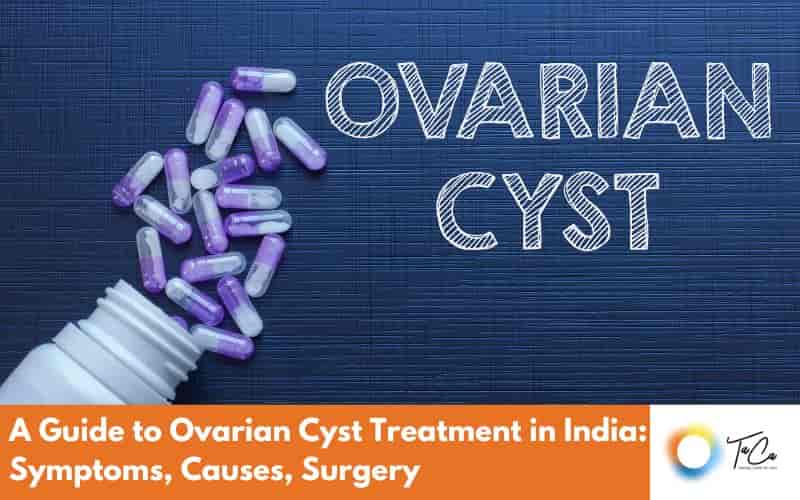Ovarian cysts are common formations that grow on or within the ovaries and contain fluid or semisolid substances. Cysts appear in a variety of shapes and sizes. The most frequent types are harmless, do not show symptoms, and eventually fade away on their own. Cysts may lead to concerns that necessitate the attention of a medical professional. Having frequent pelvic examinations could potentially lower your chances of having cyst problems.
A functional cyst is the most prevalent kind of ovarian cyst. Functional ovarian cysts occur exclusively in women who have begun menstruating but have not reached menopause.
Functional cysts are classified into two types:
- Follicular cyst: When an egg is not released, a cyst develops and it continues to develop within the ovary.
- Corpus luteum cyst: When the sac enclosing the egg fails to break down once the egg comes out, this kind of cyst forms.
Ovarian Cyst Symptoms
Some smaller cysts are asymptomatic. In many circumstances, you may be unaware that you have a cyst. Larger cysts may result in:
- Pelvic discomfort or a dull soreness in your back.
- Bloating in your lower tummy, which may be more apparent on a particular side of your body.
- Painful periods, discomfort during coitus (dyspareunia).
If your symptoms persist, you may have polycystic ovary syndrome (PCOS). PCOS is a hormonal disorder that causes irregular periods and other hormone-related issues such as obesity and infertility. Other symptoms of polycystic ovarian syndrome include hirsutism (excessive body hair growth) and weight loss challenges.
Ovarian Cyst Causes
The causes of various forms of ovarian cysts vary. The following factors are potential causes of developing ovarian cysts:
- Hormonal complications. Taking clomiphene (Clomid) to help you ovulate may raise your chance of cysts.
- The ovulation cyst may remain on your ovary after you become pregnant and all through the entire pregnancy.
- Cells that normally line the interior of your uterus proliferate outside of it. These misdirected cells might connect to your ovary and develop into a cyst.
- A alarming pelvic infection. If this grows to your ovaries, it might result in cysts.
- An ovarian cyst that has previously existed. If you’ve already had a minimum of one ovarian cyst, you’re more likely to develop more.
Ovarian Cyst Diagnosis in India
The problem may be diagnosed by a top obstetrics and gynaecologist (OB/GYN), or a licenced nurse. Your Gynaecologist will inquire about your medical history and symptoms. You will also be subjected to a physical examination. This will very certainly entail a pelvic exam. Your Gynae specialist might observe swelling on your ovary during the pelvic exam. This is frequently the first indicator of a cyst in women who have no symptoms.
If your doctor suspects you have an ovarian cyst, you may require tests. These can assist your doctor in determining the sort of cyst. Other issues, such as an ectopic pregnancy, can also be ruled out using tests. The following tests may be performed:
- Sound waves are used in this test to determine the size, form, and location of the cyst. The examination can also determine if the development is solid or fluid-filled.
- This method use massive magnets and a computer to generate a comprehensive map of the area in question.
- Test for pregnancy. This procedure is performed to see if the cyst is caused by pregnancy.
- Blood tests are performed. These screen for hormone imbalances and cancer. They also look to see if the cyst is bleeding.
- A tiny portion of the ovary is removed for this test. A lab examines the piece for cancer cells. If an ultrasound reveals a certain type of ovarian growth, this procedure may be performed.
Ovarian Cyst Treatment in Delhi
Several factors influence ovarian cyst treatment. It involves your age, whether or not you have periods, the size and form of the cyst, and the symptoms you are experiencing.
Waiting with mindfulness
Functional ovarian cysts normally resolve on their own. If your cyst is likely to be functioning, your provider may advise you to wait and see. A few weeks or months following your diagnosis, you may undergo a follow-up ultrasound to evaluate if your cyst has cleared on its own.
Common Medications for Ovarian Cyst
Your doctor may prescribe hormonal pills (such as birth control pills) that stop ovulation and avoid future cyst formation.
Ovarian cyst removal surgery in India
If a cyst is producing symptoms and growing in size, it require Ovarian cyst surgery. The type of surgery is determined by the size of the cyst and its appearance on an ultrasound. Among the various techniques employed are:
- Laparoscopy: This is a technique in which your physician puts a tiny camera into the abdomen through a tiny cut. They use the equipment to examine your reproductive organs and pelvic cavity. Ovarian cystectomy is the removal of an ovarian cyst using small incisions.
- Laparotomy: If the cyst is particularly big or if there are additional issues, your provider may conduct this operation.
If your Gynae surgeon detects cancer, she or he may speak with a cancer expert, sometimes known as a gynaecological oncologist, about your best choices for treatment.
Ovarian cysts are common and typically harmless, so don’t be alarmed if your doctor detects one during a pelvic exam or ultrasound. Your cyst most likely formed as a normal aspect of your monthly cycle and may disappear in a month or two. If your Gynae doctor discovers a risks with cyst, follow their advice for future measures.
TaCa Healthcare offers Best Ovarian Cyst Surgery in India in almost all cities. We have centers in Delhi, mumbai, Gurgaon, Noida etc.






